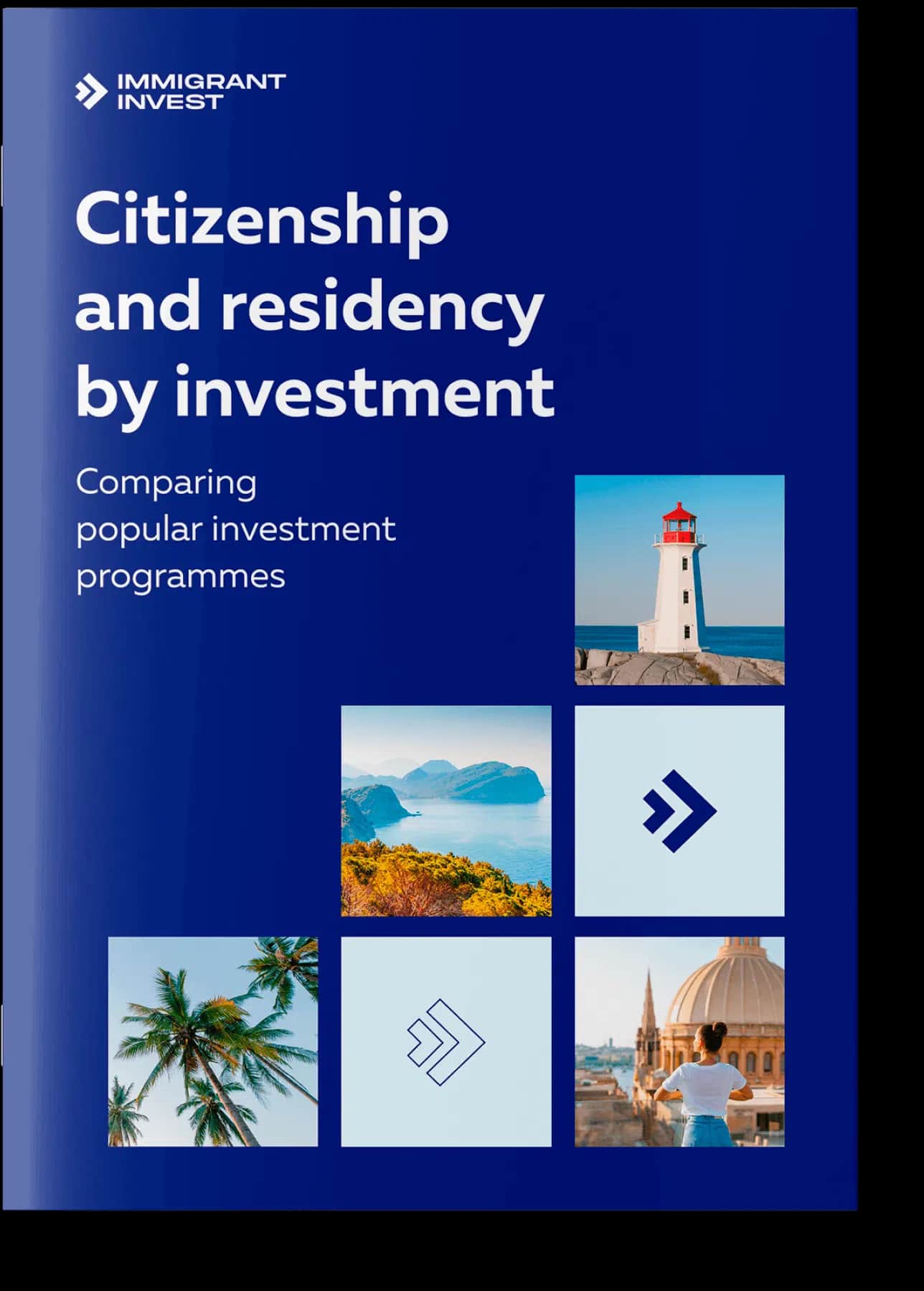Residence by investment
European residency by investment is granted in Portugal, Italy, Malta, Greece, Spain, Hungary, and Andorra. Cyprus and Malta provide investors with permanent residency, while Portugal, Malta, Austria, and Switzerland also offer residence permits to financially independent people and digital nomads.
Investors can also become UAE, the USA, Indonesia, and Thailand residents.
$25,500+
Investments
1+ months
Obtaining period
5+ years
Return on investment
21 best residence programs worldwide
CountryInvestmentsTime requiredBenefits
Portugal
€250 000+8—10 months
8—10 months
Visa-free entry to the Schengen countries
Prospect of citizenship in 5 years after obtaining and maintaining the residence permit
Safe haven in a European country by the ocean
Portugal
€9,840 a year4+ months
4+ months
Moving to Portugal at the lowest cost
Visa-free travel across the Schengen Area
Prospect of citizenship in 5 years
Portugal
€3,280 a month4+ months
4+ months
Moving to Europe and creating a safe haven
Visa-free travel across the Schengen Area
Prospect of citizenship in 5 years
Portugal
€5,176+3—4 months
3—4 months
Visa-free entry to the Schengen countries
Prospect of citizenship in 5 years
Starting a business and moving to the EU
Italy
€250,000+3+ months
3+ months
Visa-free travel to the Schengen countries
Creating of a safe haven or moving to Italy
Special tax regime
Malta
€150,000+6—8 months
6—8 months
Visa-free entry to the Schengen countries
Ability to live, study, start a business, and work in Malta
New family members can be added after the investor has received permanent residence
Malta
€30,000+3—4 months
3—4 months
Visa-free entry to the Schengen countries
Opportunity to live, study, and start a business in Malta
Tax optimisation with a special regime
Malta
€3,500+ a month5+ months
5+ months
Moving to Europe and creating a safe haven
Visa-free entry to the Schengen countries
Tax optimisation
Greece
€250,000+ Until August 31st, 20246+ months
6+ months
Visa-free entry to the Schengen countries
Possibility to live, study, and start a business in Greece
Prospect of citizenship in 7 years
Cyprus
€300,000+6+ months
6+ months
Tax optimisation
Property investment income
Prospect of obtaining citizenship in 5 years
Spain
€500,000+5+ months
5+ months
Visa-free entry to the Schengen countries
Opportunity to live, study, and start a business in Spain
Prospect of citizenship in 10 years
UAE
AED 750,000+2+ months
2+ months
Moving to the UAE or creating a “safe haven”
Tax optimisation
Opening a bank account in the UAE
Getting a driver’s licence
Hungary
€250,000+Several months
Several months
Visa-free entry to the Schengen Area
Relocation to a European country with an affordable cost of living
Tax optimisation with low rates
USA
$870,000+5+ years
5+ years
Moving to the USA or creating a safe haven
Opportunity to obtain US citizenship
Opening bank accounts in the USA
Austria
€100,000+ 3+ months
3+ months
Visa-free entry to the Schengen countries
Living in a country with a high level of safety, healthcare, and education
Permanent residence in Austria after 5 years of holding a residence permit
Switzerland
₣450,000+ per annum6+ months
6+ months
Visa-free entry to the Schengen countries
Living in a country with a high level of safety, healthcare, and education
Prospect of citizenship in 10 years
Andorra
€600,000+2+ months
2+ months
Visa-free entry to France and Spain
Simplified US and Schengen visas processing
Only 3-month residing a year to keep the residence permit
Indonesia
$130,000+1+ months
1+ months
Moving to Indonesia and creating a safe haven
Prospect of permanent residency in 3 years
Doing business and investing in Indonesia
Thailand
$25,500+1—3 months
1—3 months
Long-term visa to live in Thailand or create a safe haven for up to 15 years
Bonuses and privileges for visa holders
Tax optimisation
UK
Unavailable£2,000,000+2—3 months
2—3 months
Opportunity to live, study, and start a business in the UK
Prestigious education at British schools and universities
Prospect of citizenship in 5 years
Hungary
Unavailable€300,000+4—8 weeks
4—8 weeks
Visa-free travel to the Schengen countries
Moving to an EU country or creating a safe haven
Tax optimisation
Differences between a residence permit and permanent residency
Validity. A European residence permit is usually valid for 1 to 5 years, while the UAE, Thailand, and Indonesia issue long-term residence visas valid for up to 10 or 15 years. In any case, the holder has to renew their residence permit or visa, or it expires.
Permanent residence, however, is termless: it does not require renewal and allows you to live in the country unlimitedly.
Path to citizenship. A residence permit and permanent residence are two successive steps towards becoming a citizen:
A person obtains a residence permit.
After a few years of legal and uninterrupted living in the country, the resident can apply for permanent residency.
Citizenship applications become available several years after becoming a permanent resident.
Malta and Cyprus are the exceptions, as they grant PR by investment. Another one is Portugal, where you can apply for citizenship after 5 years of holding residence permits without obtaining permanent residency.
Some residency options are limited. For example, an investor with a Malta Nomad Residence Permit cannot qualify for permanent residency and citizenship even after living in the country for several years.
Language proficiency. When applying for investor residence, you do not need to pass a language proficiency test. In the case of other types of residence permits, it depends on the country.
Getting permanent residency after a temporary residence permit usually requires proving proficiency in the country’s official language. However, the rule does not apply to participants in Maltese and Cypriot investment programs.

Practical Guide
Select Your Ideal Investment
Download the guide to discover the differences between the popular investment programs and decide which suits you best.
9 advantages of residency in the EU
1
Visa-free travels
An EU residence permit allows you to travel to Schengen without a visa. The period of stay for 90 days out of 180.
However, if an EU member state is not part of the Schengen Area, like Cyprus, this rule does not apply. Holders of Cyprus residency need Schengen visas.
An EU residence permit allows you to travel to Schengen without a visa. The period of stay for 90 days out of 180.
However, if an EU member state is not part of the Schengen Area, like Cyprus, this rule does not apply. Holders of Cyprus residency need Schengen visas.
2
Moving to the EU
One of the main benefits of moving to the EU is safety. Other possible reasons are the great climate, especially in Mediterranean countries, political and social stability, low crime levels, and LGBTQ-friendliness.
One of the main benefits of moving to the EU is safety. Other possible reasons are the great climate, especially in Mediterranean countries, political and social stability, low crime levels, and LGBTQ-friendliness.
3
Purchase of real estate
In some EU residence by investment countries, investors can purchase properties to obtain residence permits. They can make it a second home or rent it out.
Real estate investment might be quite profitable. As an example, the price of real estate in Malta has increased by 1.5 times in the past 10 years.
In some EU residence by investment countries, investors can purchase properties to obtain residence permits. They can make it a second home or rent it out.
Real estate investment might be quite profitable. As an example, the price of real estate in Malta has increased by 1.5 times in the past 10 years.
4
Family members’ participation
Investors’ spouses and minor children may take part in residency by investment programs. Some countries grant residence permits to the investor’s children over 18 and parents.
Malta’s PR program requirements are among the most inclusive: the main applicants’ spouses, children, parents, and grandparents may be added to the application regardless of age.
Investors’ spouses and minor children may take part in residency by investment programs. Some countries grant residence permits to the investor’s children over 18 and parents.
Malta’s PR program requirements are among the most inclusive: the main applicants’ spouses, children, parents, and grandparents may be added to the application regardless of age.
5
Access to EU banks
As an EU resident, one can open accounts in international banks with high levels of financial security. Accounts are suitable for savings and international transfers.
As an EU resident, one can open accounts in international banks with high levels of financial security. Accounts are suitable for savings and international transfers.
6
Business expansion
The European Union has one of the most stable economies in the world. Businesspersons get access to loans, venture capital and other financial instruments.
The European Union has one of the most stable economies in the world. Businesspersons get access to loans, venture capital and other financial instruments.
7
Education and healthcare
With a residence permit, one can get a high-quality, world-class education in almost any field in European higher education facilities. Investor's minor children also get access to both public and private schools.
Residence permit holders have access to medical treatment all across the EU. Some countries, such as Portugal, offer free-of-charge public healthcare to their residents.
With a residence permit, one can get a high-quality, world-class education in almost any field in European higher education facilities. Investor's minor children also get access to both public and private schools.
Residence permit holders have access to medical treatment all across the EU. Some countries, such as Portugal, offer free-of-charge public healthcare to their residents.
8
Tax benefits
Some EU countries offer investors special tax regimes. For example, in Malta, foreign residents can pay 15% of the income earned outside of the country and received in it and 0% on other foreign income if they participate in the Malta Global Residence Programme.
In Cyprus, there is no tax on global income and inheritance; property and income taxes are pretty low. Greece and Italy offer flat income tax rates for new residents.
Some EU countries offer investors special tax regimes. For example, in Malta, foreign residents can pay 15% of the income earned outside of the country and received in it and 0% on other foreign income if they participate in the Malta Global Residence Programme.
In Cyprus, there is no tax on global income and inheritance; property and income taxes are pretty low. Greece and Italy offer flat income tax rates for new residents.
9
Path to EU citizenship
A resident can qualify for citizenship after several years of living in the EU country. Portugal offers the shortest path to the country’s passport — 5 years of maintaining residency. Greece and Cyprus require 7 years of residing, while Spain and Italy require 10 years.
Language proficiency and passing an exam on the country's history and culture are prerequisites, too.
An EU passport provides visa-free access to most countries of the world and allows the holder to live, work, do business, and study in any country of the region without additional permits.
A resident can qualify for citizenship after several years of living in the EU country. Portugal offers the shortest path to the country’s passport — 5 years of maintaining residency. Greece and Cyprus require 7 years of residing, while Spain and Italy require 10 years.
Language proficiency and passing an exam on the country's history and culture are prerequisites, too.
An EU passport provides visa-free access to most countries of the world and allows the holder to live, work, do business, and study in any country of the region without additional permits.
Advantages of obtaining a residence permit in the USA
The EB‑5 Visa allows foreigners to get a residence permit by investment in the USA by allocating $800,000 in business projects in high-unemployment areas or $1,000,000 elsewhere. Valid for 2 years, it can lead to a Green Card.
The benefits of the EB‑5 Investor Visa and US residency include the following:
Availability to family members. The investor can include their spouse and unmarried children under 21in the visa application.
The EB‑5 Visa leads to a conditional Green Card, with the option to apply for permanent residency after two years and US citizenship 5 more years later.
EB‑5 Visa holders can relocate to the USA and embrace the American lifestyle. The country hosts leading companies and some of the world’s wealthiest individuals. Americans are known for their friendliness and openness, and the nation’s diversity, home to 45 million foreigners, enriches cultural experiences, from cuisine to festivals. The varied climate and landscapes, from mountains to beaches, cater to all preferences.
Visa-free travelling. The Green Card grants unrestricted entry into the USA, Canada, and some South American nations. The US passport holders can travel visa-free to over 160 countries, including the Schengen member states, the UK, Canada, and Japan.
Investment returns are possible within 5—7 years, post the investment cycle completion, varying by project.
Education. EB‑5 Visa holders' children can attend US schools, learning primarily in English with options for other languages. Extracurricular activities, from sports to science clubs, enhance college admission prospects. The USA boasts top universities, with MIT leading the QS World University Rankings and nine institutions ranking in the top 20.
US healthcare, despite its high cost, offers quality services with state-of-the-art facilities, comfortable accommodations, and skilled staff. The country attracts top global medical talent and is a leader in medical research.
EB‑5 Visa holders can open US bank accounts for interest earnings or international transactions, primarily in dollars and euros, but also in other major currencies.
No sponsorship is required. Unlike other US immigration paths requiring a sponsor, such as work or student visas, the EB‑5 Investor Visa does not. Applicants simply need to comply with the EB‑5 program’s criteria.
However, there are disadvantages to consider before applying for the EB‑5 Visa. The risks include no guaranteed Green Card or investment return, with scenarios like insufficient job creation or financial struggles of the project affecting outcomes. Besides, investments must precede visa approval, risking loss if denied.

The waiting time for an EB-5 Visa application to be processed is 3—4 years, and the denial rate is relatively high
Benefits of obtaining residency in Asian countries
Two Asian residence by investment countries offer long-term visas: Thailand and Indonesia. These visas have three major common benefits:
Relocate to Asia. Thailand Elite Visa holders can live in the country throughout the card’s validity, which is 5—15 years, needing only to exit the country yearly. In Indonesia, investors can move to Bali or elsewhere for up to 10 years.
Investors can secure long-term visas for immediate family, including spouses, children, and parents.
Minimum requirements. Thailand Elite Visa applications require just a passport without providing fund sources. In Indonesia, obtaining a Second Home Visa requires only showing sufficient funds in a bank account or through a real estate purchase.
Thai residents can also benefit from low tax rates and living expenses. In Thailand, staying over 180 days makes you a tax resident, subject to local progressive tax rates of 0 to 35%. A family of four needs about $2,037 monthly for a comfortable life in Thailand, ranked among the top three Southeast Asian countries for quality of life.
Indonesia’s Second Home Visa permits business activities and investments, like buying shares and premium real estate, but not employment. After 3 years in Indonesia, investors and their families can seek ITAP, or permanent residency, renewable every five years.
Requirements for obtaining a residence permit
One can get a residence permit in another country on different grounds. Most are associated with marrying a country’s citizen, reuniting with a family, working, or studying. There are also residence permits by investment for financially independent people and digital nomads. However, most residency paths have similar requirements, such as:
Having no criminal record. The applicant must have no legal issues to be granted a residence permit.
Financial solvency. In most cases, the applicant must provide proof of legal and regular income outside the country equal to or above the set minimum level. Usually, the savings must be transferred to a local bank account, allowing the holder to live without the state’s assistance for the residence permit’s validity.
Residing in the country. A foreigner usually must spend at least 183 days a year in the country to maintain residency. However, these conditions do not apply to investors. For example, Greece and Spain don’t set a minimum residing requirement, while Portugal asks investors to spend only 7 days a year in the country.
Having a residential address. Most countries require their residents to own or rent housing in the country. Some states set the minimum price foreigners must pay for rent or purchase. However, having a registered residential address is a common requirement for permit renewal.

The investment options include purchasing real estate, fund units, or government bonds; business investments; charitable donations
Average step-by-step process for obtaining a residence permit
Applying for a residence permit involves several standard steps. Initially, an applicant must meet the residency criteria, gather the necessary documents, and apply for a residence permit. The country’s Migration Service conducts Due Diligence to decide on issuing the permit.
The whole process of becoming a resident of another state usually takes 1 month to 1 year.
Contacting a migration lawyer or a licensed agent
Most applications for residence permits are accepted from foreigners directly, so the applicants can prepare everything by themselves. However, migration lawyers and consulting companies may provide expertise and support through the application process, including preliminary Due Diligence to assess the chances of getting the desired residency.
Preparing the required documents
Necessary documents vary by country and residency path but typically include a valid passport, no criminal record certificate, birth and marriage certificates, proof of funds, a CV, and health insurance. These documents need to be translated and notarised.
Applying for residency
Applications are submitted to the Migration Service, sometimes requiring the applicant's presence or an attorney's proxy. Some countries accept applications online through government websites.
In some cases, applying for a national visa might be required first. This is the case with Portuguese residency for financially independent people and digital nomads. Such applicants get 4-month D visas from Portuguese consulates, enter the country, and apply for a residence permit on the spot.
Passing Due Diligence
This check verifies the applicant's eligibility, the legitimacy of their funds, and the absence of criminal records, determining the outcome of the residence permit application.
Receiving a residence permit card
After passing Due Diligence and getting approval, the foreigner provides fingerprints and photos. They receive residence permit cards within 2—4 weeks by mail or in person.
Residency renewal
Residence permits require renewal every 1—10 years if confirming ongoing compliance, including re-submitting documents and fingerprints. Some countries and permit types also require evidence of residing in the country.
General requirements for obtaining EU permanent residence
Becoming an EU permanent resident involves meeting specific criteria that vary slightly among member states but generally include the following six conditions:
You have lived in the country for several years. The most common requirement is to continuously reside in the host country, typically 5 years or more. This period demonstrates your commitment and integration into the country.
You have successfully passed a language exam. Completing a language exam is crucial as it shows your ability to communicate effectively in the country’s language, facilitating better social integration. The required level of language proficiency can vary but usually aligns with the Common European Framework of Reference for Languages at an A2 to B2 level.
You have a clean criminal record. Applicants must have no convictions or prosecutions in the host country or any other country where they reside. This requirement ensures that the applicant poses no threat to public safety or order.
You have a place to stay. The accommodation must meet the living standards set by the government, ensuring it is appropriate for the size and needs of your family.
You have money to support yourself and your family. The foreigner must demonstrate the financial means to live in the country without becoming a burden on the social assistance system. This can include income from employment, self-employment, pensions, investments, or other sources. The specific amount of funds required can vary, depending on the cost of living and the family size.
You have integrated into the local society. Some countries may also require participation in integration courses or civic orientation programs designed to familiarise immigrants with the country’s laws, values, and societal norms.
It’s important to check the specific requirements of the country you’re interested in, as there can be additional conditions or variations to the general criteria mentioned above.
11 key benefits of EU permanent residency
Basic advantages. The benefits of EU permanent residency are mostly the same as those of a residence permit, including:
Visa-free travel within the Schengen Area and EU.
Family members’ participation.
Opening bank accounts with high levels of financial security.
Business expansion in a stable economic zone.
Purchase of real estate for living or renting.
Moving to the EU.
Access to high-quality education and medical services.
Tax optimisation.
But there are the advantages only permanent residency can give.
Road to EU citizenship. One can apply for citizenship after living in the country for 1—5 years with a permanent residence permit.
Lifelong status. Once a foreigner obtains permanent residency, it is theirs for life. A permanent resident can stay in the country for as long as they want. The residence card has to be renewed every 5—10 years, but most of the time, the renewal is automatic: the holder has to fill out a simple application and provide the expired permit to get a new one.
No minimum residing requirement. If one obtains PR by investment, they are not obliged to spend time in the country to maintain the status.
Where to obtain residency by investment?
12 countries in Europe, the Middle East, Asia, and North America offer residence-by-investment programs. The investor’s choice depends on their tasks and goals.
Visa-free travelling to the Schengen Area. Spending 90 days out of 180 in any member state is available to EU residents.
Profitable investments with return. Investors can purchase real estate or investment fund units and sell them in several years.
🇵🇹 Portugal
🇬🇷 Greece
🇪🇦 Spanien
🇦🇪 UAE
🇭🇺 Hungary
🇨🇾 Cyprus
Low-cost relocation abroad. Residency for financially independent people and digital nomads requires fewer expenses.
Long-term residency. Unlimited permanent residency or permits for up to 15 years.
🇲🇹 Malta
🇨🇾 Cyprus
🇦🇪 UAE
🇭🇺 Hungary
🇲🇨 Indonesia
🇹🇭 Thailand
Prospect of citizenship. Applying for citizenship opens up in 5—7 years of holding residency or living in the country.
🇵🇹 Portugal
🇨🇾 Cyprus
🇬🇷 Greece
Why trust in Immigrant Invest?
Immigrant Invest, established in 2006 with offices in 7 countries, specialises in aiding affluent individuals in acquiring residence permits.
We guide clients from the preliminary Due Diligence through to residence permit issuance. Our team comprises ACAMS-certified Compliance Anti Money Laundering Officers and experienced lawyers and attorneys who possess an in-depth knowledge of requirements for applicants in various jurisdictions, help prepare documents, and apply for residency by proxy.
Immigrant Invest also helps open a bank account, find suitable accommodation, and renew residence permits when the time comes.
 Certificate of Membership
Certificate of MembershipFrequently asked questions






















